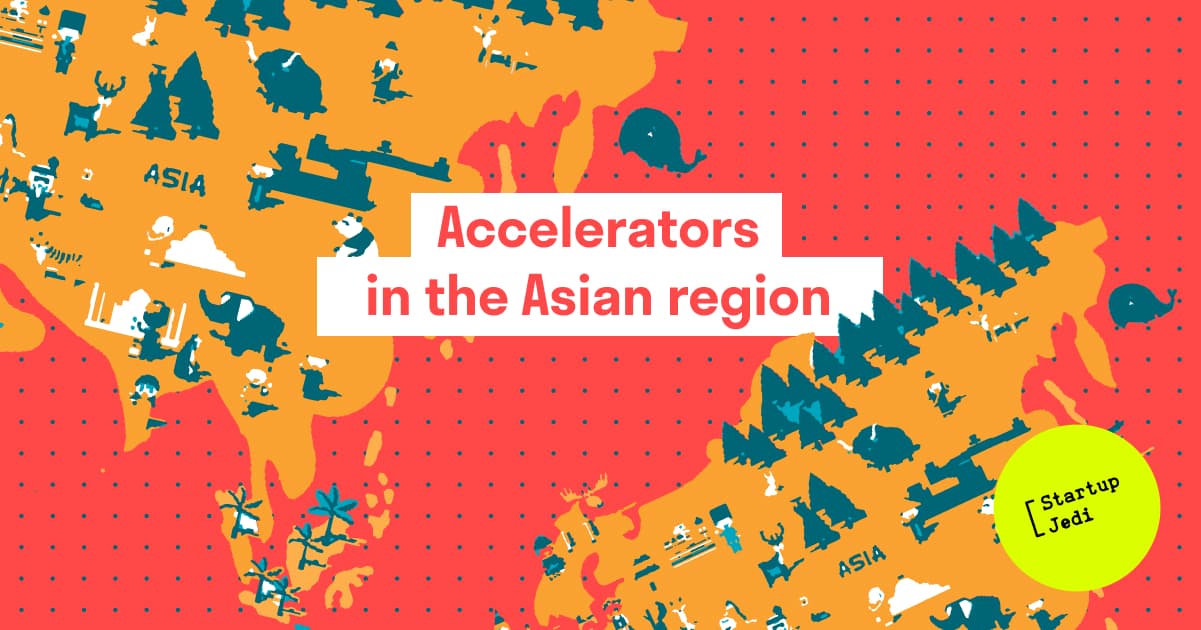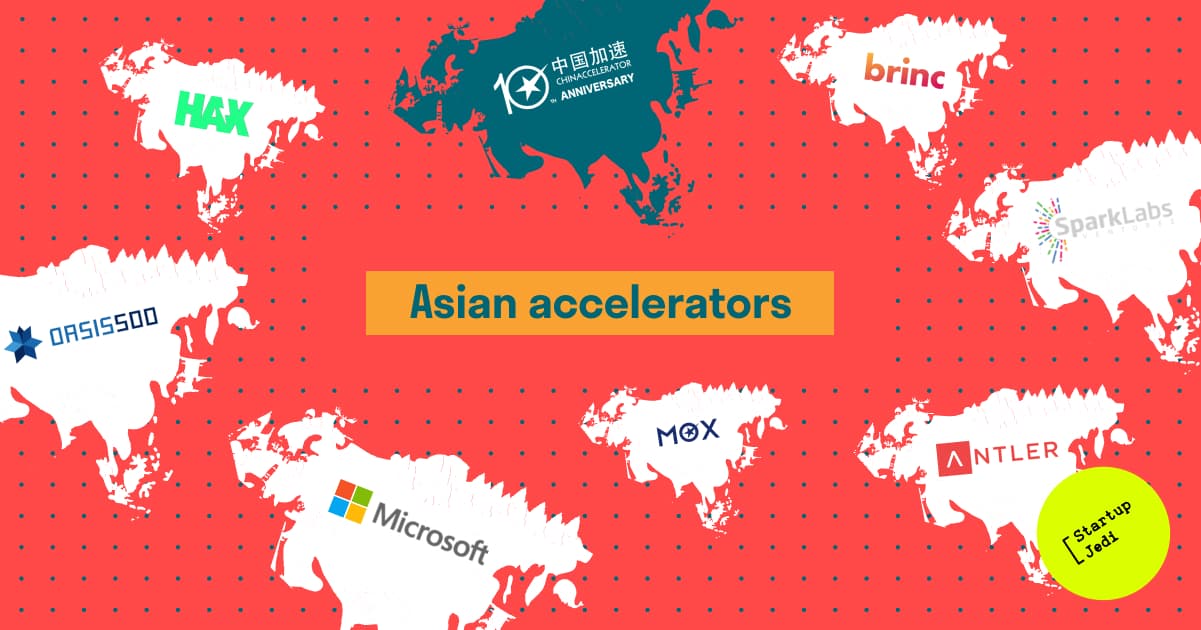
Startup Jedi
We talk to startups and investors, you get the value.
In the first three materials about the world acceleration ecosystem, we have talked about Silicon Valley, New York and other regions of North America. Today, we are moving from the American land and going across the Pacific ocean to see how accelerators are developing in Asia. We understand that it is quite hard to cover the whole Asia at once so we’ll have a veeeery long article. It’s time to get some drinks (tea, coffee or a lemonade that you like), as we have quite a long story to tell.

Startup Jedi
We talk to startups and investors, you get the value.
As of today, Crunchbase numbers less than half a thousand companies (402, in particular) in the “Accelerators in Asia” category from China to Israel. With this, fewer than half of them (197 if to be precise) have invested in at least one company. In this ecosystem, there are few remarkable hubs — China, Israel, UAE, India, Japan and Korea. Each of these markets has its peculiarities, which deserve separate articles. We, however, are now going to examine general tendencies on the Asian market.
...

Acceleration programs in Shenzhen, Shanghai, Beijing are taking the first three places in Crunchbase rating by the number of investments. For many years, China was focusing on technical entrepreneurship. For example, HAX accelerator, which is the first on the list, was founded in 2011. This company only specializes in supporting hardware projects. And this is how the Chinese market differs from the American, where the top list is formed of companies, which deal with startup support, fintech, medicine and software development. The accelerator has 392 companies and 6 successful exits. The accelerator has invested in such famous companies as Riot Games game developer; Particle, which deals with hardware and software tools for IoT prototyping; Avidbots designs autonomous robots for solving business cases in offices; Simbe Robotics, which creates solutions for audit automatisation in retail and analytics. It’s especially pleasant to mention that Petcube went through the same incubator, a startup with Ukrainian roots, and now a global company simplifying the lives of pet owners. Different companies with head-offices all over the world get to the accelerator — from Sweden to Canada and from India to Germany, while Chinese teams conclude less than 10% from the general number of teams (just 22 startups).
The second place takes Chinaaccelerator from Shanghai, which specialises in internet applications, e-commerce and software development. It was founded in 2010 and it managed to invest in 2014 startups in 10 years. However, it has fewer exits than NAX — only 4. Among its alumni there is Splitforce from New York that allowed conducting A/B tests for iOS applications; it was purchased by Localytics. Covario — a startup that allowed to work with marketing data; it was purchased by Dentsu Aegis Network, as well as Launchpilots from Hongkong that helped organise sponsorship for students’ events and was acquired by Robin8 Inc.
The third-place goes to Microsoft corporate accelerator in Pekin, which was closed in 2018. However, it still holds top positions in terms of the number of startups. Over 8 years of work, it invested in one and a half hundred companies (152 startups gone through the accelerator). Among its alumni, there are Ehang startup from aircraft industry that went public in December 2019 with an estimated value of $1,3 billion; Baikemy.com startup from China, that offers information about health, and was acquired by ByteDance in May 2020; and TradeHero, a Singapore stock exchange trading simulator, acquired by ayondo in November 2016.
Number four in our list is located on another side of Asia — in Amman, Jordan. Oasis500 has 146 startup investments, which still don’t succeed in any exit. The accelerator was founded in 2010, it specializes in technical and creative startups. With this, the accelerator is both an organiser of its own event — Seedstars Amman 2015, and an active participant of events in the Middle-East: in April 2020, they were one of the Startup Istanbul 2020 sponsors, in 2016 they sponsored SrtupWeekend in Cairo (Egypt) and StartupTurkey. They have also financially supported RiseUP Cairo in 2015.
The fifth place is taken by Microsoft company’s accelerator from Bangalore, India, which was also closed in 2018. Over 6 years, 121 teams have gone through the accelerator, and 21 of them had a successful exit. CloudCherry from Salt Lake City, America, was “disrupting” feedback interactions between companies and users; it was acquired by Cisco in August 2019. Zenatix — a startup from Khariana (India), which was dealing with energy management, was acquired by Hero Electronix in May 2018. The third successful exit of Microsoft accelerator in Bangalore that is worth mentioning is Riverie Language Technologies startup, which was creating Language-as-a-Service platform and was acquired for 1,9 billion Rupee (approx. $25 million) by Reliance Industries in February 2019.
SparkLabs accelerator from Seul takes the sixth place. It is one deal behind Bangalorean Microsoft accelerator, but there is one big difference — SparkLabs is still alive and kicking. It was founded in December 2012 and specializes in auto-industry and corporate software. Over 7,5 years it has invested in 121 startups and has 5 successful exits. Its 13-week acceleration program is aimed at startups which are focused on global markets of the USA, China and Japan. Among “graduates” of the accelerator, there is Knowre — a startup from New York, which specialized in teaching Maths in high schools; Daekyo Investment acquired the startup in August 2018. Another startup, which has gone through SparkLab acceleration is 5Rocks from Korea, that was offering analytics for developers of mobile games; Tapjoy acquired the startup in August 2014. Lastly, Emergent VR, that has offered a new method of communication in the virtual world; it was acquired by River Studios in July 2018.
Brinc — accelerator and venture fund from Honk Kong managed to get to the seventh place with 112 closed deals, which still don’t succeed in any exit. Since 2014, Brinc offers a 20-week acceleration program for startups, which specialize in health care, consumer electronics and robotics. In 2017, Brinc bought another accelerator from Honk Kong — Enter China (for an undisclosed fee). With this, the accelerator is an active participant and organiser of events for technical entrepreneurs in China, and it has more than dozens of successful events (for instance, in 2017, Brinc organised Guangzhou International Innovation Festival and in 202, it sponsored Startup Impact Summit 2020).
The next name in the list is taken by the corporate Microsoft accelerator in Tel-Aviv, and apart from his colleagues that were closed in 2018, this one is still active but focuses on ScaleUp startups instead of seed and pre-seed startups. It has 111 closed deals and 15 successful exits. Among them, Spot — an Israeli startup, which makes it easier to create public “clouds’’, and it was acquired by NetApp. Loom Systems startup from America, which was bought in January 202 by ServiceNow company; it also specializes in “cloud” solutions but for the corporate market. And the third successful exit is Presenco startup, that could “foresee” when industrial machines will be out of order before it happens; Presenco was bought by SKF Group in October 2019.
Antler is an accelerator from Singapore, which was founded in 2017 and it is kind of a new one to this market, still it managed to invest in 92 startups, which go through the 26(!)-week acceleration program with a finalizing Demo-day. The accelerator focuses on startups in IT-industry, e-commerce and software development. Magnus Grimeland, the founder of Antler, had previously founded Asia’s largest fashion marketplace for fashion products, and before that, he was the unicorn’s COO for the Global Fashion Group from Luxembourg.
MOX accelerator from Taiwan rounds out our “magnificent ten”. It offers possibilities to enter the Asian market to mobile games’ developers. It was founded in December 2015 and managed to invest in 83 startups in 4.5 years, 5 of them completed successful exits. Its acceleration program lasts 24 weeks and ends with a traditional Demo-day. Among “graduates”, there are Fleksy keyboard startup from London, which was acquired by Pinterest in June 2016; Down, a mobile dating application developer, which was acquired by Paktor in January 2017, as well as Migme startup from Singapore, which created a mobile platform for social entertainment with a chat, microblogging and other social features, which came public in August 2014.
...
If everything was more or less clear with American accelerators, then the Asian market is as colourful as their spice market. In China alone, you can find accelerators focused both on devices and mobile development, while India, Israel and other Middle Eastern countries also can show off their diversity. It is important to understand that Asian accelerators, although they offer easy access to the Asian market, do not require program participants to be from Asia (as we know, there are both American and European startups among the graduates). In our next article, we will review accelerators from the European market.
Facebook: facebook.com/StartupJedi/
Telegram: t.me/Startup_Jedi
Twitter: twitter.com/startup_jedi
Comments